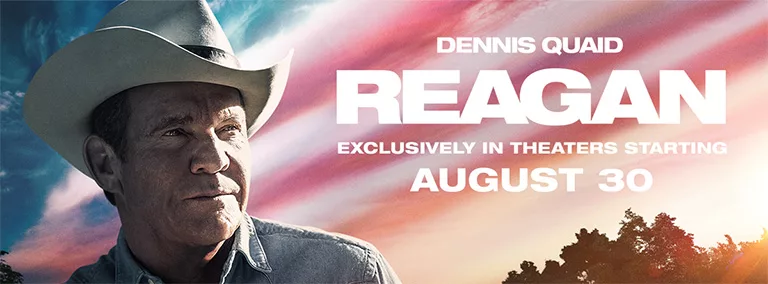
Ronald Reagan: A Legacy of Leadership, Resilience, and Vision
I first heard of the impending biopic about Ronald Reagan starring the likes of Dennis Quaid, Mena Suvari, and Jon Voigt about a year ago. There was a teaser for Reagan out on some platform and I suddenly felt like a kid before Christmas…just, like…the February before Christmas. It could have been worse, though; the film was being shot at the height of the COVID pandemic.
A lot went in to making the REAGAN Movie, including being shot during the height of the pandemic. REAGAN in theaters August 30th. pic.twitter.com/J3IlExArYr
— Reagan The Movie (@ReaganMovie) August 13, 2024
I am a Reagan acolyte, I think his leadership, humor and professionalism are sorely missed today, and when people refer to President Trump in comparison to The Gipper, it makes me a little angry. I like Donald Trump, but RONNIE?!? No way. Here’s the Trailer for your anticipation:
One of my fondest memories as a kiddo was watching the Sitcom Family Ties, where Alex P Keaton, played flawlessly by Michael J. Fox, was relentlessly mocked for his Reagan-fever. He was the model of a successful high school kid, as far as I was concerned, much more mature than those over-hairsprayed cheerleaders and surfer/jock know-nothings.
But then I realized that I don’t know a lot about Reagan. His domestic and foreign policy is the stuff of legends, but what did I miss in the era of no internet (*GASP*) and broadcast TV (*DOUBLEGASP*) about the man and his times???
So here’s a little semi-chronological look at The Gipper’s life and times. I hope you appreciate it, I hope you learn something, and I hope you go to see Reagan, in theaters Thursday, August 9th. And I hope it’s AWESOME.
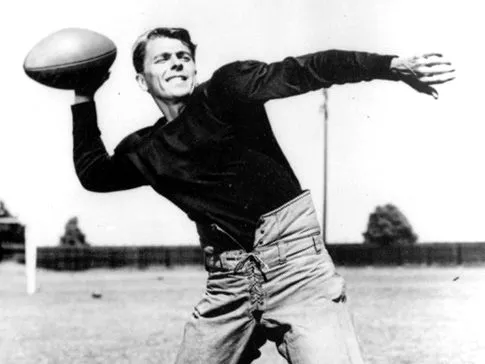
The Gipper
Ronald Reagan’s name is synonymous with American leadership, optimism, and a vision that reshaped the world stage. Born on February 6, 1911, in Tampico, Illinois, Ronald Wilson Reagan rose from humble beginnings to become one of the most influential figures in modern American history. His journey from an actor to the 40th President of the United States is a testament to his resilience, determination, and unwavering belief in the American dream. Outside of my father’s influence, Ronald Reagan is the most significant source of my patriotism, conservatism, chivalry, and love of America.
Early Life and Hollywood Stardom
Before Ronald Reagan became a household name in politics, he was known as a charming and charismatic actor in Hollywood. His journey began in the small town of Dixon, Illinois, where he developed a love for storytelling and public speaking. Reagan attended Eureka College, where he studied economics and sociology, and it was here that his leadership qualities began to shine. He served as the student body president and was known for his oratory skills, foreshadowing the great communicator he would become.
After college, Reagan pursued a career in radio, working as a sports announcer, which eventually led him to Hollywood. He signed a contract with Warner Bros. in 1937, and over the next few decades, Reagan appeared in over 50 films. While he never achieved the same level of stardom as some of his contemporaries, Reagan was well-respected in the industry for his professionalism and likability. It was during his time in Hollywood that he met and married his first wife, Jane Wyman. The marriage, though initially happy, ended in divorce in 1949, a personal setback that deeply affected Reagan.
However, it was his second marriage to actress Nancy Davis in 1952 that became one of the defining relationships of his life. Nancy Reagan was not just a devoted wife but
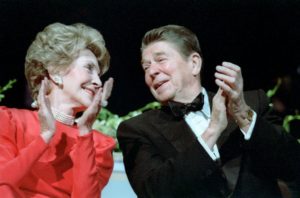
also Reagan’s confidante, advisor, and staunchest supporter throughout his political career. Their marriage was a true partnership, rooted in deep mutual respect and love, and it became a cornerstone of Reagan’s success.
Transition to Politics
Ronald Reagan’s transition from Hollywood to politics was gradual but inevitable. His political views evolved significantly over time, moving from a New Deal Democrat to a staunch conservative Republican. His growing concern over the direction of the country, particularly the spread of communism and the overreach of government, led him to become increasingly politically active.
Reagan’s powerful and persuasive speaking ability caught the attention of many, and in 1964, he delivered a televised speech on behalf of Republican presidential candidate Barry Goldwater. Titled “A Time for Choosing,” this speech is widely credited with launching Reagan’s political career. In it, Reagan articulated his vision of limited government, personal freedom, and strong national defense, themes that would define his political philosophy throughout his life.
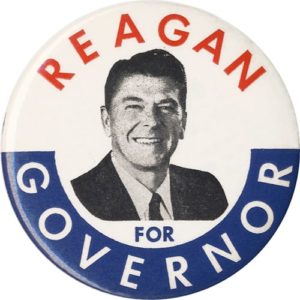
Governorship of California
In 1966, Ronald Reagan was elected the 33rd Governor of California, defeating incumbent Democrat Pat Brown. His governorship marked a significant shift in California politics, as he implemented conservative policies in a state known for its liberal leanings. Reagan’s tenure as governor was characterized by his efforts to balance the state budget, reduce government waste, and address social issues such as the growing student protests and the rise of the counterculture movement.
One of Reagan’s most notable achievements as governor was his handling of the University of California system, which had become a hotbed of student activism and unrest during the 1960s. Reagan took a firm stance against the protests, emphasizing law and order and the need for discipline. His approach was controversial, but it resonated with many Californians who were concerned about the chaos and instability of the times.
Reagan also worked to reform the state welfare system, aiming to reduce dependency on government assistance and encourage self-reliance. His welfare reforms were a precursor to the national welfare reform efforts he would pursue as president. Under Reagan’s leadership, California emerged from a period of economic uncertainty and social upheaval stronger and more stable.
The Road to the Presidency
After serving two terms as governor, Reagan set his sights on the presidency. He made an unsuccessful bid for the Republican nomination in 1976 but gained significant support within the party. In 1980, Reagan ran again and secured the Republican nomination, going on to win a landslide victory against incumbent President Jimmy Carter.
Reagan’s presidential campaign was built on the promise of restoring America’s strength, both economically and militarily. He tapped into the frustrations of a nation struggling with high inflation, unemployment, and a perceived decline in global influence. Reagan’s message of hope, renewal, and American exceptionalism resonated with voters, and he won the 1980 election by a wide margin.
The Reagan Presidency: A Time of Renewal
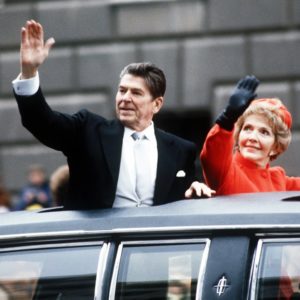
Ronald Reagan’s presidency, which lasted from 1981 to 1989, is often referred to as the “Reagan Revolution.” His administration ushered in a new era of conservative policies, economic growth, and a renewed sense of American pride. Reagan’s presidency was marked by several key achievements, both domestically and internationally, that solidified his legacy as one of the greatest American presidents.
Economic Policies and Reaganomics
One of Reagan’s most significant accomplishments as president was his economic policy, commonly known as “Reaganomics.” Faced with a struggling economy, Reagan implemented a series of tax cuts, deregulation, and reductions in government spending aimed at stimulating economic growth. The Economic Recovery Tax Act of 1981 was one of the largest tax cuts in American history, reducing the top marginal tax rate from 70% to 50%. Reagan believed that by lowering taxes, individuals and businesses would have more money to invest, leading to increased economic activity and job creation.
Reaganomics also included a focus on reducing government regulation, which Reagan argued stifled innovation and economic growth. His administration rolled back many regulations, particularly in the energy and telecommunications sectors, fostering a more competitive and dynamic economy.
The results of Reagan’s economic policies were impressive. By the mid-1980s, the United States was experiencing one of the longest peacetime economic expansions in its history. Inflation, which had been a significant problem in the 1970s, was brought under control, and unemployment rates dropped significantly. While critics argued that Reagan’s policies disproportionately benefited the wealthy and increased the national debt, there is no denying that Reaganomics played a crucial role in revitalizing the American economy.
Foreign Policy and the End of the Cold War
Ronald Reagan’s impact on global politics was profound, particularly in his role in ending the Cold War. Reagan took office at a time when the United States and the Soviet Union were locked in a tense and dangerous standoff. Reagan’s foreign policy was built on the principle of “peace through strength.” He believed that the best way to secure peace was by maintaining a strong military and demonstrating the United States’ willingness to use it if necessary.

Public Domain
One of Reagan’s most famous foreign policy initiatives was the Strategic Defense Initiative (SDI), often referred to as “Star Wars.” Announced in 1983, SDI was a proposed missile defense system that would protect the United States from a nuclear attack. While the technology behind SDI was highly ambitious and controversial, the program sent a clear message to the Soviet Union that the United States was committed to maintaining its technological and military superiority.
Reagan also took a hard line against the Soviet Union, famously labeling it the “evil empire.” However, despite his tough rhetoric, Reagan was also a pragmatic leader who understood the importance of diplomacy. He pursued arms control negotiations with Soviet leader Mikhail Gorbachev, resulting in a series of landmark agreements that significantly reduced the nuclear arsenals of both countries.
The most significant of these agreements was the Intermediate-Range Nuclear Forces (INF) Treaty, signed in 1987. The INF Treaty eliminated an entire class of nuclear weapons and marked the beginning of the end of the Cold War. Reagan’s willingness to engage with Gorbachev and his recognition of the changing dynamics within the Soviet Union were instrumental in bringing about a peaceful resolution to the decades-long conflict.
Reagan’s foreign policy successes extended beyond the Cold War. He played a key role in supporting anti-communist movements in Central America, particularly in Nicaragua and El Salvador, and provided military and economic assistance to countries resisting Soviet influence. Reagan’s commitment to promoting democracy and freedom around the world left a lasting impact on global politics.
Domestic Achievements and Challenges
While Reagan’s foreign policy achievements were significant, his domestic policies also left a lasting legacy. One of the most notable aspects of Reagan’s presidency was his commitment to restoring American pride and confidence. In his first inaugural address, Reagan famously declared, “In this present crisis, government is not the solution to our problem; government is the problem.” This statement encapsulated Reagan’s belief in limited government and the power of individual initiative.
Reagan’s administration worked to reduce the size and scope of the federal government, implementing policies that encouraged private sector growth and innovation. His administration also focused on strengthening the nation’s defense capabilities, leading to a significant increase in defense spending. This buildup not only contributed to the eventual collapse of the Soviet Union but also reaffirmed America’s position as the world’s leading superpower.
Despite his many successes, Reagan’s presidency was not without its challenges. The Iran-Contra affair, a scandal involving the secret sale of arms to Iran and the diversion of funds to support anti-communist rebels in Nicaragua, cast a shadow over Reagan’s second term. While Reagan maintained that he was unaware of the illegal activities, the scandal damaged his administration’s credibility and led to significant public and congressional scrutiny.
However, Reagan’s ability to connect with the American people and his unwavering optimism helped him weather the storm. By the time he left office in 1989, Reagan had an approval rating of 63%, a testament to his enduring popularity and the deep affection many Americans felt for him.
Personal Life and Legacy
Beyond his political achievements, Ronald Reagan’s personal life and character left an indelible mark on those who knew him and on the nation he led. Reagan was often described as a man of deep convictions, humility, and kindness. His relationship with Nancy Reagan, in particular, was central to his life and legacy. The Reagans’ marriage was one of deep affection and mutual respect, often described as a true partnership. Nancy was not only Reagan’s wife but also his closest advisor and confidante. Throughout Reagan’s presidency, she played a significant role behind the scenes, offering counsel and support during some of the most challenging moments of his political career.
One of the most poignant aspects of Ronald Reagan’s life was his battle with Alzheimer’s disease, which he revealed to the public in a letter in 1994. In the letter, Reagan wrote, “I now begin the journey that will lead me into the sunset of my life.” His openness about his diagnosis helped raise awareness of the disease and highlighted the courage and dignity with which he faced this final challenge. Nancy Reagan became a fierce advocate for Alzheimer’s research, dedicating herself to finding a cure for the disease that ultimately claimed her husband’s life.
Reagan’s passing on June 5, 2004, marked the end of an era. His funeral was attended by world leaders, dignitaries, and everyday Americans who came to pay their respects to a man who had profoundly impacted their lives and the world. The outpouring of grief and admiration was a testament to the enduring legacy Reagan left behind.
The Impact of Reagan’s Leadership on World Politics and American Life
Ronald Reagan’s impact on world politics and American life is self-evident. His leadership during a pivotal time in history helped to reshape the global order, bringing an end to the Cold War and reaffirming America’s role as a beacon of freedom and democracy. Reagan’s unwavering belief in the principles of liberty, free markets, and strong national defense set the stage for a new era of American prosperity and influence.
Domestically, Reagan’s presidency ushered in a period of economic growth and renewed optimism. His policies of tax cuts, deregulation, and government restraint helped to revive the American economy and laid the foundation for decades of prosperity. Reagan’s vision of limited government and personal responsibility continues to influence conservative thought and policy in the United States.
Reagan’s legacy also extends to his role as a communicator and unifier. Known as “The Great Communicator,” Reagan had a unique ability to connect with the American people and inspire them with his words. His speeches, filled with optimism and faith in the American spirit, resonated with millions and helped to restore a sense of pride and purpose in the nation.
Reflections on Reagan’s Life as Depicted in the New Biopic
The new biopic about Ronald Reagan captures the essence of his life, focusing on the personal and political challenges he faced and the triumphs he achieved. The film delves into Reagan’s early years, his Hollywood career, and his transition into politics, providing a comprehensive look at the man behind the public persona. It highlights the pivotal moments in Reagan’s life, from his time as governor of California to his two terms as president, showcasing the determination and resilience that defined his leadership.
The biopic also explores Reagan’s relationships, particularly his marriage to Nancy. Their love story is depicted as a central theme, illustrating the deep bond that sustained Reagan through the ups and downs of his political career. The film portrays Nancy as a vital part of Reagan’s success, underscoring her role as his most trusted advisor and her influence on his decision-making.
Through the lens of the biopic, viewers gain a deeper understanding of the personal challenges Reagan faced, including his battle with Alzheimer’s disease. The film does not shy away from the difficulties of his later years, offering a poignant look at the man who, even in the face of adversity, remained steadfast in his principles and love for his country.
“You don’t become President of the United States. You are given temporary custody of an institution called the Presidency, which belongs to our people.” – President Ronald Reagan speaking at the @GOP Republican National Convention #OnThisDay in 1988. #Reagan #POTUS pic.twitter.com/z1sIdaodzx
— Ronald Reagan Presidential Foundation & Institute (@RonaldReagan) August 15, 2024
Conclusion
Ronald Reagan’s life and legacy continue to inspire and influence generations of Americans. His leadership during one of the most challenging periods in modern history helped to shape the world we live in today. Reagan’s unwavering commitment to freedom, his belief in the power of the individual, and his optimism for the future set him apart as one of the greatest presidents in American history.
As we reflect on Reagan’s life, it is clear that his impact extends far beyond the policies he implemented or the speeches he gave. Ronald Reagan was a leader who believed in the potential of every American and in the greatness of the nation he served. His legacy is one of hope, courage, and enduring faith in the American spirit.
The new biopic serves as a fitting tribute to Reagan’s life, capturing the essence of his character and the profound impact he had on the world. It reminds us that Reagan’s story is not just one of political success, but of personal resilience, deep love, and a relentless pursuit of the American dream. Ronald Reagan will be remembered not only as a great president and governor but as a man who embodied the very best of what it means to be American.
Find more about Reagan, starring Dennis Quaid, in theaters Thursday, August 26th, click here to find the theater near you!
Dennis Quaid says Facebook is banning the Reagan movie from advertising because it’s anti-communism and could sway the American election..
This should tell you all you need to know about the Democrat Party in America.. pic.twitter.com/XDzwsVLL8Q
— Matt Couch (@RealMattCouch) August 18, 2024
